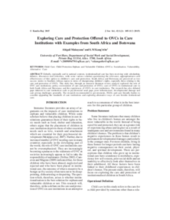ABSTRACT
Globally, regionally and in national contexts, institutionalised care has been receiving wide scholarship, debates, discourses and criticisms, with some various scholars questioning the relevance, appropriateness and effectiveness of this option to children’s care and protection. South Africa and Botswana are perceived as two success stories in Southern African region in terms of championing children’s rights, especially those relating to the care and protection of OVCs. This study has, through an immense literature review analysis explored: the role of OVC care institutions; policy environment of care and protection of OVCs; care of OVCs in institutional care in both South Africa and Botswana; and the experiences of OVCs in care institutions. The research has also debated gaps inherent in care institutions such as psychosocial need gaps, poor infrastructure, developmental damage and care giving challenges generally. The research recommended to governments, NGOs and care friendly bodies to consider upgrading the standards of care institutions and exploring alternative ways of care besides institutional care.

